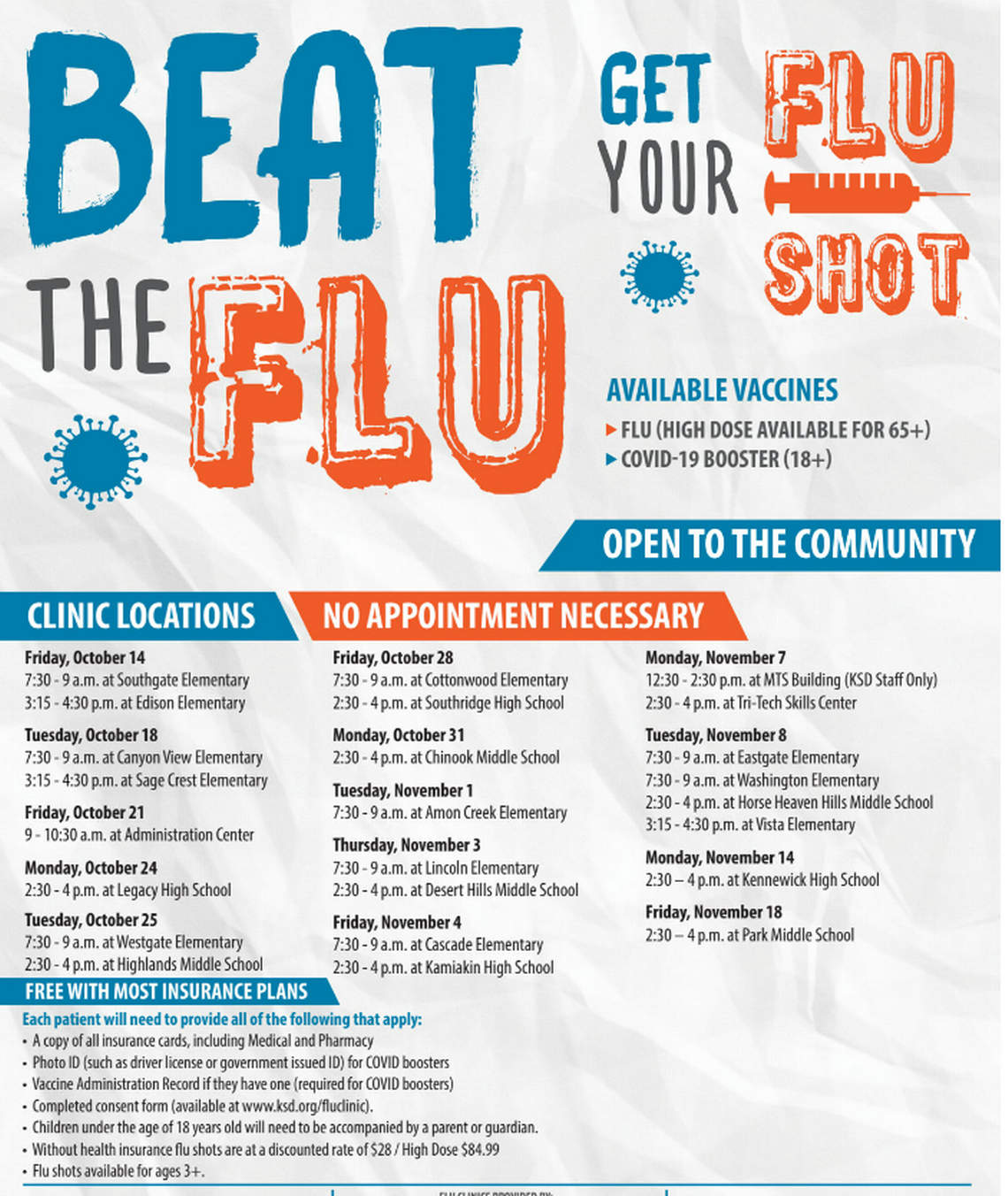5 more Tri-Cities COVID deaths. Hospitals admitting more children for RSV
With the fall and winter season for respiratory illnesses just beginning, five more deaths from complications of COVID-19 have been reported in the Tri-Cities area.
They included people from their 50s into their 80s.
Public health officials are concerned as respiratory syncytial virus, or RSV, is sending people to the hospital and there are indications a rough influenza season could be ahead. RSV poses a particular risk to babies and the elderly.
Data on COVID-19 has shown a continued decline of the presence of the virus in the Tri-Cities, but public officials are concerned that it could rebound with the rest of respiratory illnesses in the fall and winter.
The Benton Franklin Health District has known it was only a matter of time before RSV that started showing up earlier than usual this year on the East Coast also spread across the nation to Washington state, said Heather Hill, infectious disease supervisor for the Benton Franklin Health District, speaking last week on the Kadlec on Call podcast.
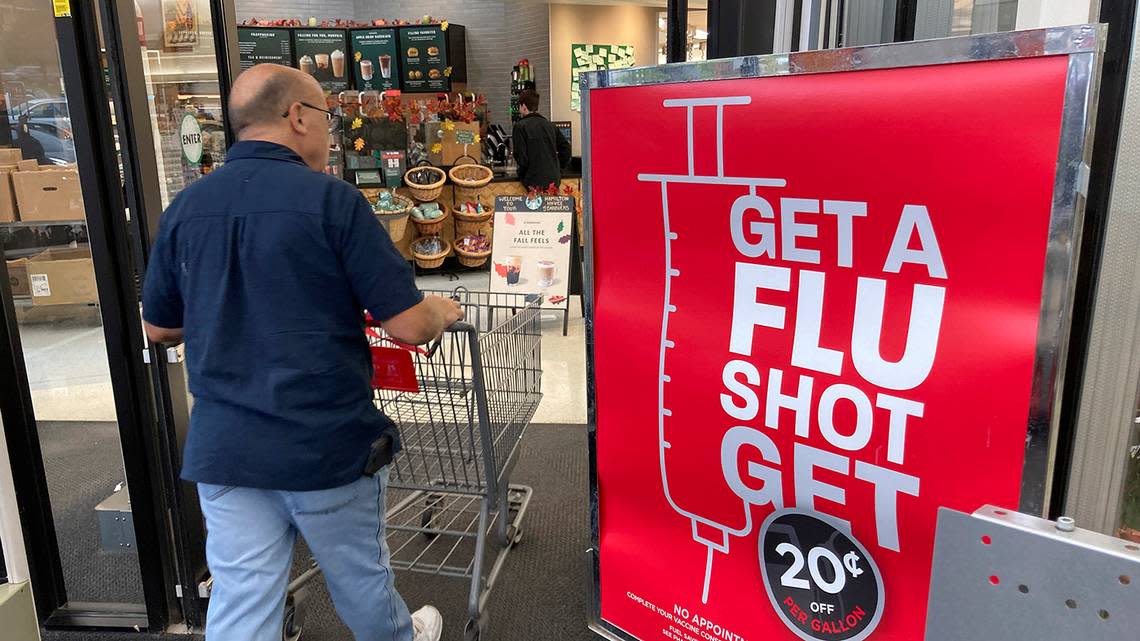
Most pediatric hospitals in the state, including Seattle Children’s Hospital and Mary Bridge Children’s Hospital in Tacoma, are seeing record high emergency department volumes due to RSV and other respiratory viruses, said Dr. Tao Sheng Kwan-Gett, the Washington state Department of Health chief science officer, during a Thursday news briefing.
“Hospitals are already at high capacity and very stressed and when you add in complications by an early and severe season of highly contagious respiratory viruses, that puts an even greater strain on the system,” he said.
Tri-Cities RSV cases
In recent weeks Tri-Cities area hospitals have been reporting more patients admitted for treatment of RSV, Hill said.
The cases are not stressing hospitals now, but “we have a long RSV season ahead of us,” she said.
During much of the COVID-19 pandemic, measures that protected against COVID also helped protect against RSV. Many young children have not developed any immunity to the virus, which has created significantly worse RSV in the nation this year, Hill said.
Symptoms are similar to other respiratory viruses and include a low fever, cough, wheezing, fatigue, a runny and stuffy nose, decreased appetite and decreased activity, particularly in infants, Hill and Kwan-Gett said.
If parents see those symptoms get significantly worse, they need to get medical attention for their child, Hill said.
They may see a young child’s skin turn dusky blue around the lips and mouth, the child may breathe rapidly and their shoulders may go up and down as they work to pull air into their lungs, she said.

RSV is the most common cause of bronchitis and pneumonia in babies, Kwan-Gett said.
There also is evidence that children who are sick with RSV are more likely to develop asthma or recurrent wheezing later in life, Hill said.
Older people get RSV as well, but most of the time do not require hospitalization, Hill said. The exceptions are elderly people and people with other conditions, such as heart and breathing issues.
WA and Tri-Cities flu
Flu season has arrived in Washington state, said Dr. Umair Shah, the Washington state secretary of health, during the Thursday news briefing.
Already two people in the state are known to have died from influenza this fall, he said.
“This is a reminder that flu remains deadly,” he said.
Public health officials have been concerned that the flu season could be severe in Washington state this year, after Australia had a very early and unusually long flu season.
The number of cases reported in the state remains low and neither of those who died in the state were from Benton or Franklin counties.
Flu activity was lower than usual in the Tri-Cities area the past two years due to steps taken to prevent COVID-19, including wearing masks, social distancing and avoiding crowded spaces.
“As the COVID-19 restrictions reduce, we expect the flu to be highly active in our region,” Hill told the Tri-City Herald.
This year’s season for Benton and Franklin counties is difficult to predict. But in a typical flu season before the pandemic, hospitalizations in the Tri-Cities area usually increased in November, peaked in December and January, and then decreased in March and April, she said.
“The best way to protect yourself as we begin November and the holiday season full of gatherings is to get your flu shot now,” she said. “It takes two weeks from the flu shot to build the proper protection and immunity.”
Good respiratory hygiene, such as frequent hand washing, sneezing into your elbow and wearing a mask in crowds, also can help reduce the risk of catching the flu.
WA and Tri-Cities COVID
Cases of COVID-19 have trended downward since mid summer, other than a bump up in September, Kwan-Gett said.
But Washington needs to be prepared for a potential increase this winter.
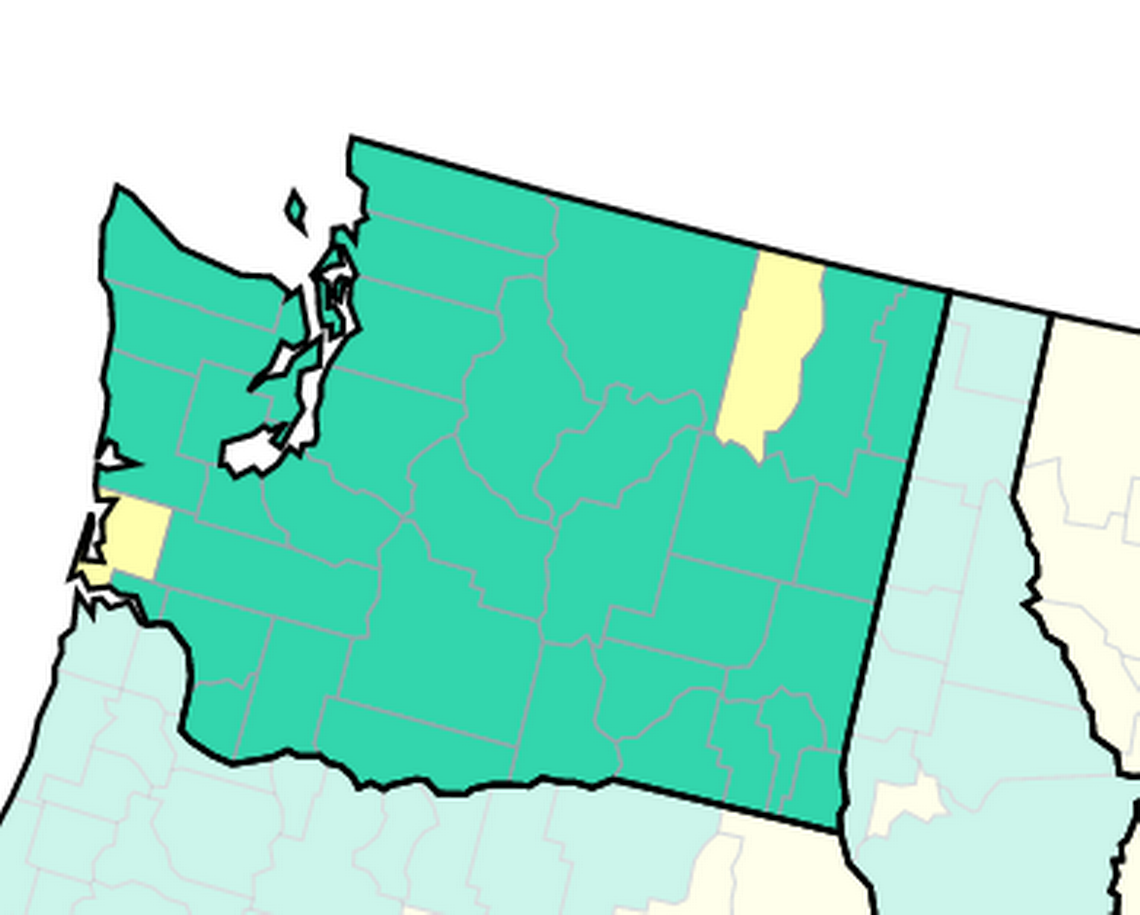
More people will be gathering indoors as the weather turns cold, increasing the chances of transmission, he said.
There also is the possibility that one of the new, more transmissible subvariants of the virus that are continually appearing now could become dominant and create a new wave of cases, he said.
People could be infected as their immunity from vaccination or having the disease wanes, he said.
Europe has seen a rise in cases in recent weeks, an indicator that could also happen in the United States, he said.
Although masks are not required now in most places in Washington state, people should still consider wearing them in crowded spaces, poorly ventilated spaces or if they are with people who are vulnerable to serious illness from COVID-19, he said.
In the Tri-Cities, data other than the five deaths were little changed from the previous weeks.
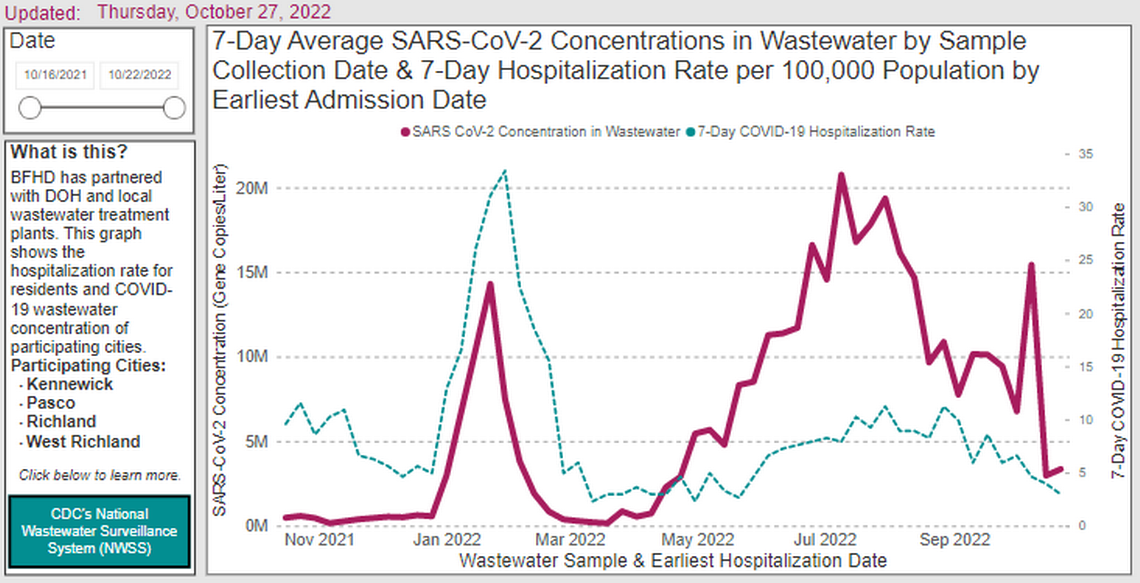
The best indication of the prevalence of the coronavirus in the community, checks of samples of municipal wastewater in Richland, Kennewick, Pasco and West Richland, were about the same as a week ago.
Concentrations of genetic material from the coronavirus in Tri-Cities wastewater have dropped for two weeks now to a level that hasn’t been that low since spring.
The new case rate, which doesn’t include most cases diagnosed through home test kits, was at 36 new cases per 100,000 residents of Benton and Franklin counties, in the most recent report. It’s close to the rate reported a week ago.
Just 13 people were hospitalized over a week in the two counties for treatment of COVID-19, the same number reported a week ago.
Tri-Cities COVID deaths
The recent Tri-Cities area deaths announced Thursday included three Benton County residents — a woman in her 50s, a man in his 60s and a man in his 80s.
The other two deaths were Franklin County men in their 70s and 80s.
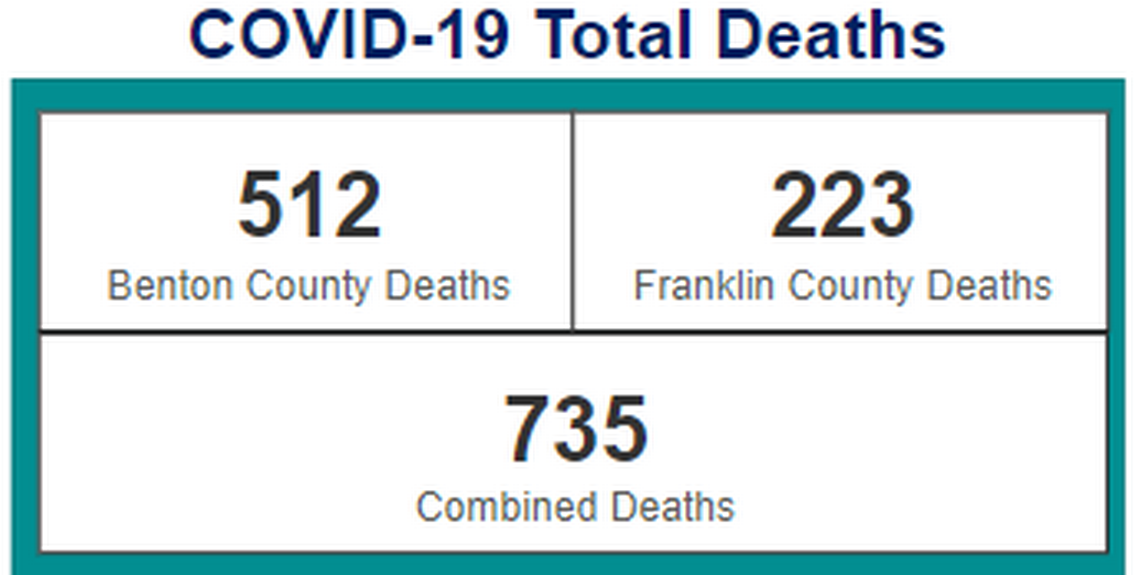
They bring the number of recent deaths announced weekly by the Benton Franklin Health District to eight, which is down from 11 or 12 deaths announced in recent months.
Since the start of the pandemic 735 people in the Tri-Cities area have died from COVID-19, including 512 residents of Benton County and 223 residents of Franklin County.
Statewide 14,450 Washington state residents have died from complications of COVID-19.
On Monday the state of emergency and emergency COVID-19 orders will be rescinded by Gov. Jay Inslee, as he announced Sept. 8.
“While we are grateful for the thousands of lives we saved together, thousands of lives were also lost, and many more were changed forever,” Inslee said on Friday.
Washington state had one of the lowest COVID death rates in the nation during the pandemic, with the state currently have the fifth lowest death rate nationwide, his staff pointed out.
If the rest of the nation had the same death rate as Washington, some 433,000 more lives could have been saved, his staff said.
Although COVID emergency orders are being lifted, the Washington state Department of Health will continue to require masks in health care and long-term care facilities. They also may be required in prisons and jails, depending on local community COVID-19 levels.
The department of health plans to re-evaluate masking requirements in mid November.
The Centers for Disease Control and Prevention on Thursday updated its weekly community COVID-19 ratings to give 37 of the 39 counties in Washington state a COVID-19 community level rating of “low.” Ferry and Pacific counties were rated as “medium.”
The CDC bases its COVID-19 community level ratings not only on new case rates, but also hospital beds used by patients with COVID and hospital admissions for people with the disease.
COVID vaccines
The best way people can take to protect themselves and their loved ones during respiratory virus season is to get a flu shot plus the COVID vaccination and COVID omicron booster, Shah said.
There is no vaccine for RSV.
Elderly people and people with underlying health conditions are vulnerable to serious cases of COVID and are more likely to be hospitalized or die if they are not fully vaccinated and have received the new omicron booster, according to the CDC.
However, only 15% of the state’s population ages 12 and older have received the new booster, said Lacy Fehrenbach, the chief of prevention, safety and health for the Washington state Department of Health.
Even though nearly 95% of Washington state residents 65 and older have completed their primary series of COVID-19 vaccinations, less than 30% of those people have gotten an updated booster, she said.
The new booster is in good supply now and is available at most pharmacies, sometimes without an appointment. Flu shots and the booster can be given at the same appointment.
The Benton Franklin Health District posts information on free COVID-19 vaccine clinics at covid19.bfhd.wa.gov/covid-19-vaccine-information.
Pharmacies and other sites providing COVID vaccines can be found at vaccinelocator.doh.wa.gov or by calling 800-525-0127.
